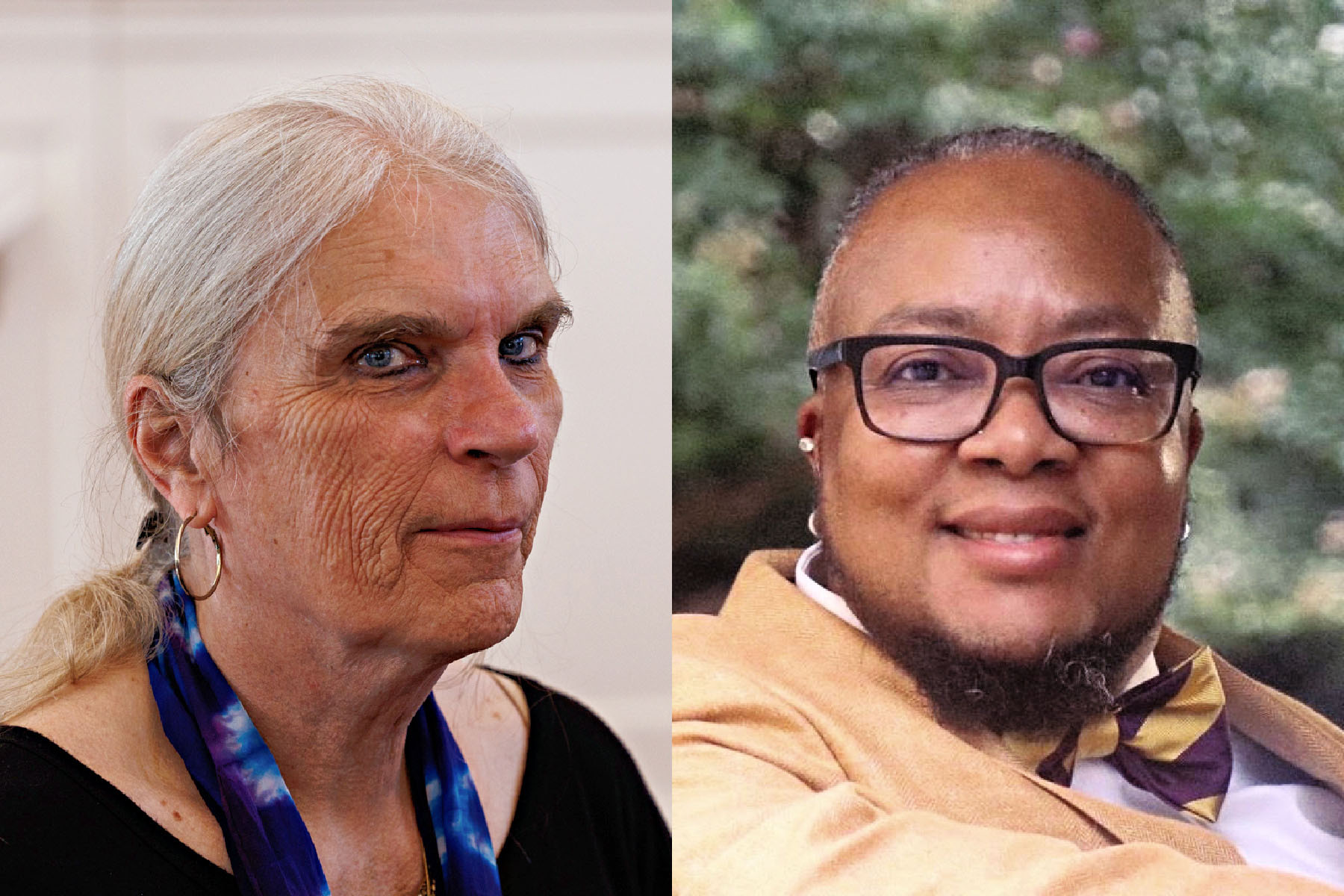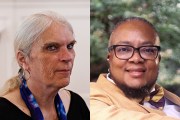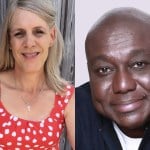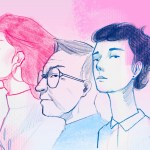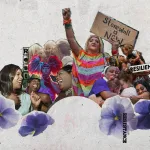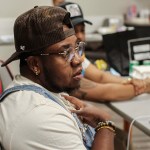What do you want to know about caregiving, aging and disability? We want to hear from you, our readers, about what we should be reporting and how we can serve you. Get in touch here.
Transgender older adults aren’t the most visible members of the LGBTQ+ community, but they’re here — continuing to carve out unique spaces for themselves and redefining cultural norms around aging.
They’re taking up new hobbies, taking up space and drawing inspiration from younger trans people.
Pride Month: Resistance, resilience, recreation and rest
This story is part of our Pride Month coverage. From lived experiences to in-depth Q&As and survey data, we’re focused on telling stories highlighting themes that reflect the complexity of emotions elicited by this moment in time. Explore our work.
The 19th selected four themes to guide our Pride Month coverage this year: Resistance, resilience, recreation and rest. The 19th spoke with four different transgender older adults about their stories and what these themes mean to them.
In this second part, The 19th spoke with Michelle Guzowski, who was recently featured in a short documentary about her bowling career, about recreation. She is joined by Yunus Coldman, who recently retired, about figuring out what rest means to him as he enters this new phase of his life.
These interviews have been edited for length and clarity.
Michelle Guzowski, she/her, 66
- Cleveland, Ohio
- Occupation: Semi-retired and working part-time as a grocery store cashier
On Recreation
Sara Luterman: Tell me a little bit about your life. Where were you born? What was it like for you growing up?
Michelle Guzowski: I was born to a middle-class family in Cleveland, I was one of eight children. There’s a 30-year difference between the oldest and the youngest. We never fought at all while we’re growing up. It was a loving family.
My father was Archie Bunker, but more prejudiced. And my mother was a good Christian Catholic woman. I was raised Catholic. If I had to classify myself, I would say, I act in a Christian manner. I do not identify with any formal religion.
I always knew that I was different. But back when I was growing up, “transgender” wasn’t even a word. I had to keep my feelings to myself.
How far do you want me to go?
As far as you feel comfortable going. You can share whatever you think is most important.
I’m a founding member of the Cleveland Transgender Choir, which is through Baldwin Wallace University. I’m also a member of Wind Song, which is a feminist chorus. It’s been around for over 40 years. To the best of my knowledge, I am the first openly transgender member. I don’t know how to read or write music, but I can compose.
-
Read Next:
When do you feel like you joined the LGBTQ+ community?
Back in the 80s I kind of did? I wasn’t out. I was a member of Paradise Club, which is a club for crossdressers. We’d get together at a hotel or motel and just get dressed and BS.
About 11 years ago or so, I decided that it was time to come out. I was doing some online stuff and realized that there were more people like me out there. I wasn’t alone.
It wasn’t easy, but it was one of the best things I ever did. Right up there with having my gender reassignment surgery, which will be five years in July. I call that my rebirth day.
That’s a nice way to think about it.
It is. I try to be open at work and everywhere. I’m pretty much an open book if people ask me questions. I know that can get you in trouble, possibly, but I’ve never really encountered any open hate or physical threats. Just some verbal things here and there.
I take things with a grain of salt. I can’t help it if people are ignorant, and they can’t help their own ignorance either.
When did you start bowling?
I’ve been bowling since I was knee-high to the curb. When I grew up, where I grew up, we could ride our bikes to the bowling alley and bowl three hours for $1.50. And we would all go there constantly. I used to watch professional bowling on television every week. When I got older, I bowled in high school and bowled in college. It’s a release.
Back in the day, it was one of the few places where you could smoke and drink while you were competing. That was back in the day. Now you can’t do anything. When I competed in a tournament [recently] I couldn’t do either. I couldn’t even smoke on the grounds of the bowling alley where the tournament was being held. I had to completely leave the premises to go smoke a cigarette.
Tell me a little bit about the tournament.
It’s for professional bowlers — it was my first professional tournament. You have to pay an entrance fee, and there’s certain things that you have to do to qualify. Your average has to meet a standard. And you have to be bowling in a certified league. It’s been a bucket list item for me for a long time.
So as a whim, I sent the tournament an email and told them I don’t really qualify. I bowled unsanctioned leagues, and I’m not averaging 190. But I’m 66 years old, and I’ve been watching bowling forever. I asked for a complimentary entry into their tournaments and they gave me one.
I’m 99 percent sure I was the oldest person ever to compete in one of their tournaments. They listed me as S.S. in the official score thing, which stands for “super senior.” I bowled terribly because I was in over my head. Had it not been for a woman who withdrew, I would have been in last place, but I do not care. It was a bucket list thing. And I did it.
I bowled 12 games in one day. I don’t know if you ever bowled but that’s a lot. I know people who bowl two games and they’re dead tired.
What does recreation mean to you?
Recreation to me means doing something that keeps you in shape. Not just physically but emotionally and spiritually. To me, those two things are bowling and singing. Singing might not be a recreation to some, but for me it is. It’s an escape, it’s my place where I can be myself.
We are hosting a Sister Singers Network Festival at the end of [June]. Lesbian feminist choruses from all over the country are coming to Cleveland. We’re anticipating anywhere from 400 to 600 attendees. On the last day, July 1, we will be hosting a mass chorus. Imagine 400 to 600 women singing together. It’s my first time joining, and I’m really excited.
How often do you go bowling?
Well, their season is like 32 weeks. So I go once a week. That’s when I have my beers. It’s the only day I drink beer. In fact, I have not had one since we went to Charlotte promoting [“Our League,” a PBS documentary featuring Guzowski], and that was about three weeks ago.
I’ve had issues in the past with alcohol and drugs. Not terribly bad. But I was in college in the 70s. I went to the University of Dayton. Playboy used to rank their top 10 party schools and they said they wouldn’t put us in there because they don’t rank professionals. I learned a lot about life. Life lessons, which are way more valuable than book learning. College isn’t for everyone. Not at all, especially now with the cost of it these days.
Are there any political issues in Ohio or nationally that you’re really concerned about right now?
Honestly, I’m probably the least political person you could talk to, but I am aware of all of the anti-trans legislation that is being passed in Ohio and all around the country. It’s terrifying.
What wisdom would you like to share with younger people, particularly younger trans people?
Our transgender choir recently lost a choir member, a dear friend of mine, to cancer. I gave a little speech at Cleveland Pride about it when we performed. And at the end of it, I said, don’t ever, ever be afraid to show your true colors. Don’t deny yourself, deny your true self for others.
Yunus Coldman, he/him, 65
- Long Island, New York
- Occupation: Retired from being a call center coordinator for a community health center
On Rest
Sara Luterman: Tell me a little bit about your life story. Where were you born? What was it like for you growing up?
Yunus Coldman: I was born in the South, but I was not raised in the South. I’ve been in New York since I was three months old. Most of my upbringing was in Harlem. As a young adult, I was in the East Village. I’ve been out on Long Island for about 30 years.
I am an ordained interfaith minister. I’m also an associate pastor with Rivers of Living Water New York, and I’ve been a member there for 13 or 14 years now.
When do you feel like you joined the LGBTQ+ community?
I’ve been part of the LGBT community since I can remember. At minimum, I would say junior high school was when I realized that I am a member of that community, even though then it wasn’t called that.
Our words are very different than when I grew up. Then, everybody was gay. We didn’t even really use the word “lesbian” or “bisexual.” When I was in junior high school, in high school, everybody was just gay.
I transitioned in my 50s. There was a remarkable time in my life, when I actually had the opportunity to be among a group of trans people. And it dawned on me in that moment, that was the missing piece of my life.
For the most part, I knew I was not for lack of a better term, I knew I was not “regular.” We didn’t have the term cisgender yet. But I knew that I still was different. I identified as a masculine-of-center lesbian person. But it still didn’t get me quite right. But that was the closest that I would get to it for a while. And then there was this epiphany that the piece that was missing was that I was transgender.
What political issues are you most concerned about right now?
Probably all of them? But I will narrow it down for you this way. I am a Black trans man, who is a minister, all of those intersections concern me and my community. And when I say my community, I don’t mean just the trans community, I mean LGBT community. Because when one of us is marginalized and targeted, we all are.
What does the word rest mean to you?
Rest for me, at this time in my life, means not being a part of the working-class grind.
I retired not too long ago. I’m still working — everything that I’m doing is around activism and advocacy and ministry. But working a 9 to 5? I’m not doing that, Thank God. I have done it. I am now resting permanently from that, but I am fully active in other things.
So for me, rest right now is just not being part of the rat race. I’m not part of that whole cycle of working every day 9 to 5, Monday to Friday. For me, that’s what rest is.
How did you prepare to retire? Was it difficult to save money? What were some of the things you needed to sort out first?
I decided to do it at the very last second. My mental health, my physical health and my spiritual health were in jeopardy. Working since I was 17. I hit 65. I realized that I was having difficulty, my mind was tired and my body was tired. My spirit was tired. So I had to make a hard decision.
But I had some advice from some people. My daughter, my friend, my brother. All of that to make a decision. And I decided that I’d had enough.
I have faith that I will make it. I have my Social Security, which isn’t a whole lot. Even if you’ve got the maximum, it still isn’t a lot. If you’re living in New York, it’s still not a lot. Social Security will take care of a chunk of things that I need, to make sure that I can survive. For the rest, I do have some savings on the side. I do speaking engagements, I’m on panels.
I’m going to also rely on community in ways that I never had to before. I’m not going to ask anybody to pay my rent or anything like that. But I will take advantage of things like the food pantry to make sure I’m eating every day in the right way.
But as far as the money is concerned, I’m not too worried, simply because I have faith that my creator will make sure that everything is okay. My creator will also make sure that there are people who will make sure that I am taken care of.
Are there people you know in your community that want to retire, but who can’t, or who will need to get help to do so? How common is that experience?
It’s a lot more common than people might think, particularly in the trans community. When it comes to trans women, especially Black trans women, the number that live and survive and thrive beyond a certain age is not a lot. The suicide rate in the trans community, Black trans community is very high among trans masculine people.
When we talk about retirement, for the trans community, that’s a hard question. Who has a regular job in the trans community? Very few have a regular job with a pension or a 401(k), or any of that. Very, very few.
Our seniors are surviving by living off the community. The community helps out a great deal. But for those who are not working regular kinds of jobs, there is fear. It’s like, “Where am I going to get my next meal? My medical [care]? Who is going to help me with that?” It’s daunting. I try to help out as much as I can with the limited resources that I have.
What are some ways that you’re looking forward to rest being more present in your life, now that you’re retired?
I’m trying to figure that out. I have been working for 47 years.
I know I don’t watch nearly as much television. I am participating in more things in the community. I do a little arts and crafts. I used to draw – I haven’t done that in 30 years. I can tend to my plants better.There’s some woodcraft to do. There’s some music that I haven’t listened to in years.
I’m dealing with people in a different way. That’s all part of the rest for me. Because I can do it in a relaxed way. I’m not rushing.
Resting means allowing myself to be a human being, not a human doing. We’re indoctrinated to be to do. I just want to be an explorer. I want to explore what just being looks like for me.
Is there any wisdom that you’d like to share with younger folks, particularly younger trans folks?
It’s funny you ask that. I’ve thought a lot about that lately. Overall, I would say, do what you can with your life. Just do it. It may be hard, it may seem daunting, but do it. Take care of yourself.
I’m so afraid right now. I’m particularly afraid for those living in parts of this country. We live in the Wild West again [when it comes to LGBTQ+ rights]. I thought we got past that. Be safe. Find your space, spiritually, mentally, physically. Find what you need in those areas of your life. If there’s something that’s lacking, fill those voids so that you can be a whole person, a whole being for yourself.
Is there anything that I didn’t ask about that you think is important for people to know?
Define rest for yourself. Don’t allow anyone to say what rest is for you. For some people, rest might be just being horizontal, not doing anything. For others [it] might be, I don’t know, just sitting on the couch listening to music, doing a jigsaw puzzle. Determine rest for yourself. Is it mental, spiritual, physical, or emotional? How do you find ways of making sure that you’re addressing all those things? As a minister, I have to add that we do tend to forget the spiritual part of ourselves. That truth sometimes needs rest.
